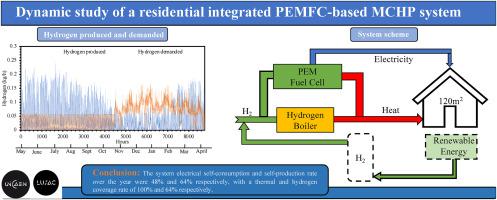International Journal of Hydrogen Energy ( IF 8.1 ) Pub Date : 2024-01-01 , DOI: 10.1016/j.ijhydene.2023.12.240 Rafik Elkhatib , Raffaele Petrone , Hasna Louahlia

|
This paper investigates an innovative study on the performance of a hybrid condensing boiler-fuel cell micro-cogeneration system for single residential applications. It combines experimental and dynamic numerical investigations including renewable energy for green hydrogen production and solid storage. Basing on the hourly measurements for a typical winter day, a dynamic model was developed and validated against different home heating need. Highlighting the influence home energy needs on fuel cell operating mode, it shows that single homes with low energy demand led to reduce the fuel cell's yearly operation below 50 %. In low-energy homes, a reduction in fuel cell size led to an increase in yearly operation to 60-70 % and achieved a 55 % electrical coverage rate. The integration of metal hydride hydrogen solid storage, powered by renewable sources, is emphasized. This setup increases heat demand, influencing fuel cell operation. In winter season, fuel cell operated for an average of 611 h, compared to 61 h in summer. System efficiency averaged 91 % annually, peaked at 95 % in summer, and sustained 93 % when both FC and condensing boiler were switched on.
中文翻译:

环保住宅混合锅炉燃料电池MCHP机组氢气优化的动态研究
本文研究了针对单一住宅应用的混合冷凝锅炉-燃料电池微型热电联产系统性能的创新研究。它结合了实验和动态数值研究,包括用于绿色氢生产和固体存储的可再生能源。根据典型冬季的每小时测量结果,针对不同的家庭供暖需求开发并验证了动态模型。强调了家庭能源需求对燃料电池运行模式的影响,表明能源需求低的单一家庭导致燃料电池的年运行减少到50%以下。在低能耗家庭中,燃料电池尺寸的减小使年运行率提高到 60-70%,并实现了 55% 的电力覆盖率。强调了由可再生能源驱动的金属氢化物氢固体存储的集成。这种设置增加了热量需求,影响燃料电池的运行。冬季,燃料电池平均运行 611 小时,而夏季为 61 小时。系统效率年平均为 91%,夏季达到峰值 95%,并且在 FC 和冷凝锅炉同时开启时保持 93%。






























 京公网安备 11010802027423号
京公网安备 11010802027423号